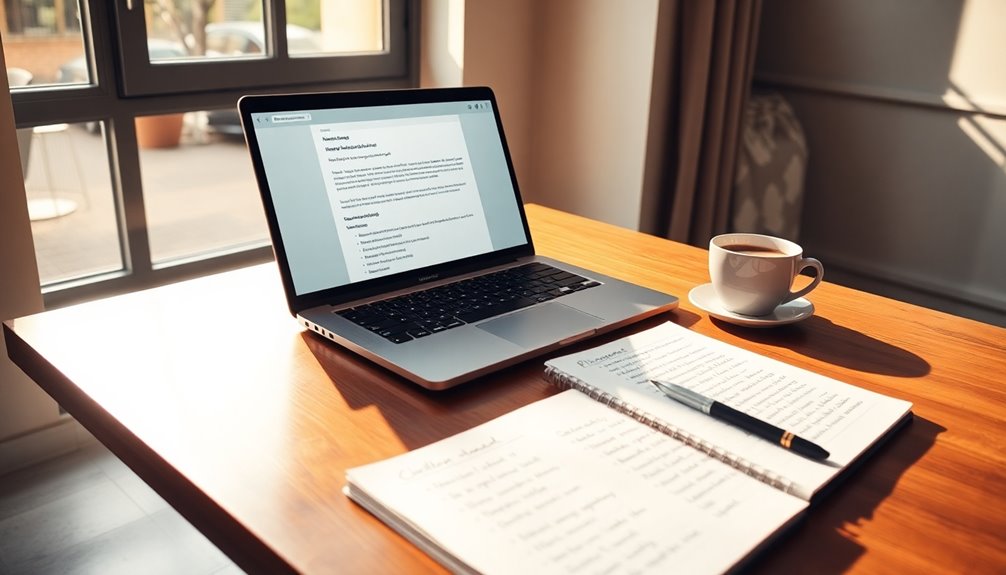Mastering the art of stress interviews means shifting your mindset from fear to opportunity. These interviews test your ability to handle pressure and maintain composure. You'll encounter tough questions like, "What's your greatest weakness?" and "Describe a time you failed." Keep your answers concise and use the STAR method to structure your responses. Practice answers with a friend to simulate stress, and focus on lessons learned from past challenges. Remember to calm your nerves with deep breathing and visualization techniques. There's more to discover that can help you tackle these interviews with confidence.
Key Takeaways
- Understand the purpose of stress interviews: they assess your ability to handle pressure and adapt to challenging situations.
- Use the STAR method to structure your responses, ensuring clarity and relevance in your answers.
- Maintain composure by pausing before answering, and highlight positive takeaways from past challenges.
- Practice mock interviews to simulate stress, refining your skills and building confidence.
- Incorporate stress management techniques, such as deep breathing and mindfulness, to keep anxiety in check during the interview.
Understanding Stress Interviews

When you're faced with a stress interview, it's crucial to understand that this method is designed to evaluate how you handle pressure.
Employers often use this approach for high-stakes roles, aiming to see how you perform under challenging conditions.
Stress interviews create a tense atmosphere to assess your problem-solving skills, adaptability, and resilience.
They focus on whether you can maintain composure and communicate effectively when the heat is on.
Recognizing this can help you shift your mindset from fear to opportunity.
Instead of viewing the interview as a threat, see it as a chance to showcase your ability to thrive in demanding situations, demonstrating your fit for the role and the company culture. Additionally, developing skills in emotional support and counseling can enhance your ability to cope with stress during interviews.
Typical Stress Interview Questions

Stress interview questions can feel intimidating, but understanding their purpose can help you navigate them with confidence. These questions are designed to evaluate how well you handle pressure and your problem-solving abilities.
Here are some typical stress interview questions you might encounter:
- "Why did you leave your last job?"
- "Tell me about a time when you made a mistake at work?"
- "What is your greatest weakness?"
- "Describe a time you failed. How did you handle it?"
- "What would you do if you'd to meet a tight deadline?"
Being prepared for these inquiries can make a significant difference in your performance.
Effective Answering Techniques

Mastering effective answering techniques can greatly boost your performance in stress interviews. Start by maintaining your composure; take a moment to gather your thoughts before responding. Use the STAR method to structure your answers clearly. Highlight positive aspects, even when discussing challenges, to showcase your learning and adaptability. Keep your responses concise and honest, acknowledging difficulties while emphasizing lessons learned.
| Technique | Description | Example |
|---|---|---|
| Maintain Composure | Pause to think before answering | "That's an interesting question; let me reflect." |
| Use STAR Method | Structure responses with Situation, Task, Action, Result | "In my last job, I faced a tight deadline…" |
| Highlight Positives | Frame challenges to show growth | "I learned from my mistake by…" |
Preparation for Stress Interviews

Preparing for a stress interview requires strategic planning and a proactive mindset. You'll want to familiarize yourself with the company and the role's demands.
Consider these key preparation strategies:
- Research the company culture to understand potential stressors.
- Practice with mock interviews to simulate the pressure you might experience.
- Develop personal stories that highlight your resilience and problem-solving skills.
- Learn stress management techniques, like deep breathing or visualization, to calm your nerves.
- Seek feedback from peers or mentors after practice sessions to refine your performance.
- Understanding the importance of emotional intelligence can enhance your ability to navigate stress during interviews.
Managing Interview Anxiety

Managing interview anxiety is vital for performing your best during a high-pressure situation. To tackle this anxiety, start by practicing deep breathing techniques. Inhale deeply for four counts, hold for four, and exhale for four. This simple method calms your mind and body.
Next, visualize a successful interview; picture yourself answering questions confidently. Preparation also plays an important role—review common stress questions and rehearse your responses. Engaging in mock interviews can help you become more comfortable with potential stressors. Additionally, incorporating mindfulness practices into your routine can enhance your self-awareness and further reduce anxiety levels.
Post-Interview Self-Assessment

After wrapping up your interview, it's important to take a moment for self-assessment. Reflecting on your performance can help you identify strengths and areas for improvement.
Here's what you should focus on:
- Analyze Your Responses: Consider how effectively you answered the stress questions.
- Evaluate Your Composure: Reflect on how well you managed pressure during the interview.
- Identify Learning Opportunities: Think about what you could do differently next time.
- Seek Feedback: If possible, ask for constructive criticism from peers or mentors.
- Document Your Insights: Write down your reflections to track your progress for future interviews.
This process won't only enhance your skills but also prepare you for future stress interviews.
Building Long-Term Resilience

Building long-term resilience involves actively developing strategies that help you bounce back from setbacks and thrive under pressure.
Start by embracing challenges as opportunities for growth. When you face difficulties, reflect on what you've learned and how you can apply that knowledge in the future.
Practice stress management techniques like deep breathing or mindfulness to stay centered during tough times. Surround yourself with a supportive network that encourages your growth and shares valuable insights.
Set achievable goals to build your confidence, and celebrate your progress, no matter how small.
Finally, maintain a positive mindset—focus on solutions rather than problems.
Frequently Asked Questions
How Can I Identify if an Interview Will Be Stressful?
To identify if an interview will be stressful, pay attention to the company's culture and the role's demands.
Research online reviews or ask current employees about their experiences. If the interviewer seems aggressive, asks unexpected questions, or creates a high-pressure atmosphere, it's likely to be a stress interview.
Additionally, if the job involves handling high-stakes situations, expect a more challenging interview process.
Trust your instincts and prepare accordingly.
What Industries Commonly Use Stress Interviews?
You might think stress interviews are reserved for the high-pressure world of astronauts or bomb squad operators, but they're actually common in various industries!
You'll find them in finance, emergency services, retail, sales, law enforcement, and hospitality.
These sectors thrive on quick thinking and resilience, so they use stress interviews to see how you handle pressure.
It's all about evaluating your adaptability and composure when the stakes are high!
Are Stress Interviews Effective for All Job Roles?
Stress interviews aren't effective for all job roles. While they help evaluate candidates in high-stakes environments like finance or emergency services, they can be counterproductive for positions requiring collaboration and creativity.
You might find that such interviews create unnecessary anxiety, leading to less authentic responses. Instead, consider the role's demands and whether evaluating stress management truly reflects the skills needed for success in that position.
Tailoring your approach is key.
How Long Do Stress Interviews Typically Last?
Think of a stress interview like a high-stakes game of chess. Typically, these interviews last around 30 to 60 minutes, but the duration can vary.
You'll find yourself maneuvering unexpected questions and scenarios designed to test your mettle. It's vital to stay composed, as time flies when you're under pressure.
Can I Ask the Interviewer to Clarify a Question During a Stress Interview?
Yes, you can definitely ask the interviewer to clarify a question during a stress interview.
It's a smart move that shows you're engaged and want to provide a thoughtful answer. When you ask for clarification, it not only helps you understand the question better but also demonstrates your ability to communicate under pressure.
Just remember to stay calm and composed—this will help you maintain a positive impression, even in a high-stress situation.
Conclusion
Just like a seasoned sailor navigates stormy seas, you can master the choppy waters of stress interviews. Embrace the waves of pressure, using them to steer your responses with clarity and confidence. Each question is a tempest, but with the right preparation and mindset, you'll find your anchor and sail smoothly toward success. Remember, it's not about avoiding the storm, but learning to dance with it. So, set your course and face those interviews with resolve!









